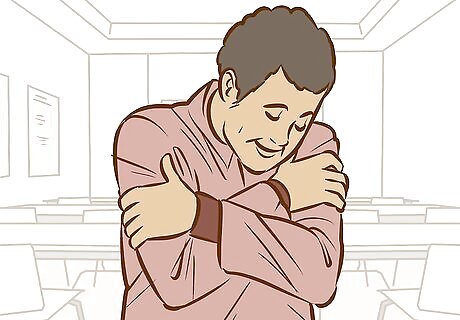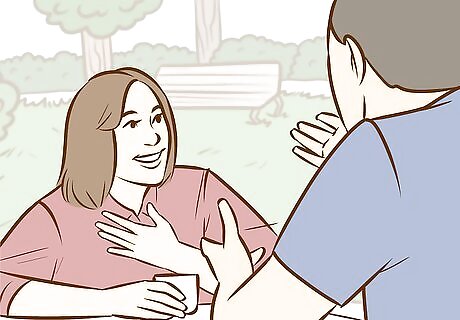
views
Approaching Your Differences Positively

Accept yourself just as you are. Whatever your differences, don’t push against them. Identify your strengths and choose to feel good about them! Give yourself freedom from living up to the standards of other people. Be happy with who you are without wanting to change. Remember, nobody is ‘typical’ and that differences make each person unique. For example, if you have a disability, recognize that you are more than your disability. You might choose to be kind, caring, honest, and a good cook. You might feel down about not being able to do things other teens do, but love the things you can do and the person you are. Make sure to consider all of the ways that your uniqueness benefits other people.

Be compassionate toward yourself. When you feel like being critical or harsh on yourself, be kind and compassionate instead. If that’s hard to do, imagine what you would say to a friend if they came to you with a struggle. For example, say to yourself, “Even though I feel different, I don't have to feel bad about myself. I look different from my peers, but that doesn’t make me weird or less than them.” Make sure to say positive things about your uniqueness out loud to yourself.

Practice positive affirmations. If you need a boost to help you accept yourself, practice self-affirmations. These are statements that affirm something positive about yourself as you are (or want to be). When saying or writing an affirmation, say it in the present tense as if it already is true. For example, say, “I love and accept myself exactly as I am.” You can also say, “I accept my differences and know they make me unique.”
Adjusting Your Mindset

Rethink your ideals. If you don’t fit in, that’s okay. Try adjusting your mindset and embracing yourself as you are. If fitting in feels uncomfortable or like you’re trying to be someone you’re not, make some changes to how you approach feeling good about yourself. Your differences are what make you unique and special, so don’t try to get rid of them! Think about what you really want. If your goal was to become popular at school, adjust your goal to feeling comfortable being who you are and finding friends who make you feel good. Think about the people who are important to you, such as your friends, parents, or teachers. If your parents are your biggest supporters, then consider their opinions above the opinions of other people.

Remember that you’re not alone. Whatever you have going on, you’re not the only person who struggles. Even if you’re the only person in your school from a certain culture or racial background, you’re not alone in feeling the way you do. Everyone feels alone or lonely from time to time. The important thing is to recognize that you’re not alone, however alone you feel. If you feel alone, reach out and spend time with people you love.

Change your negative thoughts to more positive ones. Positive thinking is important for self-acceptance. It’s easy to feel critical of yourself or of the things that make you feel different. If you find yourself thinking negatively about yourself, practice noticing those thoughts and how they affect you. Then, try replacing the thought with a more positive and loving thought. For example, replace, “I wish I was different so I would fit in” with, “I can embrace what makes me different, even if it makes me sad sometimes.” Another option is to replace, “I don’t have many friends at school,” with something like, “I don’t have much in common with people at school, but the people in my gaming group really understand me.”

Share how you truly feel instead of masking your feelings. If you try to be extra bubbly or funny as a way to fit in or get attention, you might feel like people won’t like the real you if you don’t put up these personas. Plus, this puts pressure on you to be that way, even if you don’t feel like it. Take a step back and find other ways to relate to people that feel more genuine to who you are. Share your true feelings instead of masking them. The more authentic you are to yourself, the better you will be able to relate to people in a genuine way. Everybody experiences a range of emotions, so let yourself feel them, too. For example, if you’re having a bad day, let yourself have a bad day. You don’t have to pretend to be happy if you feel miserable inside.
Getting Support

Spend time around people who appreciate you for who you are. It is important to surround yourself with people who appreciate you for who you are and who will make you feel good about yourself. Doing this will help you to feel more positively about yourself. Spend your fee time with people who support you and encourage you, and steer clear of people who put you down or who focus on negative things.

Find like-minded friends. Knowing that you're different can make being a teen even harder. So maybe you’re not like everybody else, but you are like some people. Find a community or group of people who accept you the way you are. One way to meet people similar to you is by joining clubs and activities. For example, if you love a certain hobby (like playing cards), find other people who also like that hobby. If you feel alone in being LGBT, for example, find other teens who are also LGBT. Maybe you’re the only one in your town, but you’re not the only one in your state or territory. You can always join an online group.

Get support from your family. Especially if you have a hard time fitting in at school, lean on your family for support. Your parents likely want to give you support and help you, especially if you’re struggling. Ask them to talk with you or do something fun together. If you need a listening ear, ask them to listen without judging you or giving you advice. Sometimes, parents don’t know how to connect well with teens. You might need to take the initiative to talk, but your parents likely want to support you and be there for you.

Seek mental health treatment if you’re struggling. If you have a mental health diagnosis (such as depression, anxiety, obsessive-compulsive disorder, or bipolar disorder), talk to a therapist. Not only can they help you deal with your symptoms, they can also help you accept yourself and navigate life while feeling ‘different.’ Talking to a therapist is unlike talking to a friend or family member; you can tell them anything (like your deepest fears and biggest secrets) and they won’t judge you. If feeling different affects how you feel about yourself, you can seek therapy to raise your self-esteem and build your confidence.

Deal with social anxiety. If you have an extreme fear of being judged in social situations to the point where you feel alone, powerless, and ashamed to do anything about it, then you might have social anxiety disorder. If you think you might have social anxiety, seek treatment. You can learn skills and how to cope by seeing a therapist. Find a therapist by asking your parents to call their insurance or a local mental health clinic. Make sure to look for someone who has experience working with people who have social anxiety. A therapist may encourage you to take medications to help you manage your social anxiety. You can obtain medications by seeing your physician or going to a psychiatrist.

Join a support group. Whatever you’re going through, you’ll likely find someone else your age who can relate. One of the best ways to meet other people with similar struggles includes attending a support group. Whether the support group meets in person or online, you can give and receive support and advice, talk honestly about your experiences and feelings, and gain a sense of empowerment and control. Find a support group my contacting local mental health centers or hospitals. You can also do a search online to find a local or online group.



















Comments
0 comment